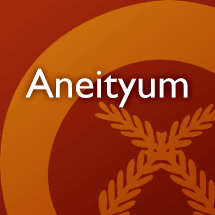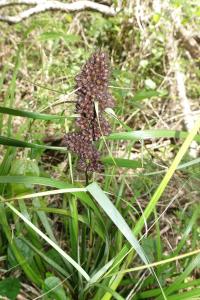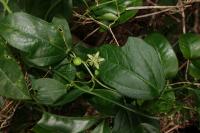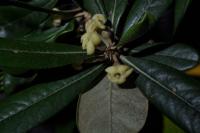Your search for * in games has returned 26 entries
incetcanalaeñ
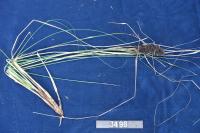
incoujahao
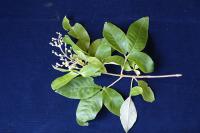
n. shrub, 2 m tall (collection: Gregory M. Plunkett #3548)
Example: The forked stick of this plant is used as a pole to hold the outrigger on a canoe. Children blow the small fruits of this plant through the hollow petioles of the papaya leaf or a hollowed bamboo stem as a game. As an aphrodisiac, two handfuls of the leaves of this species are boiled in fresh water and men drink these for 7 days. The next week they will be "strong." People cannot have sex while they are drinking this remedy, but then the next week when they have finished the treatment, they will be "very strong."
bookmarkincoujahau
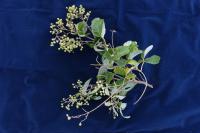
n. tree, 6-8 m tall (collection: Gregory M. Plunkett #3218)
Example: 1. Take a handful of leaves, squeeze with the hands into 1/2 liter of water, drink when tired; said to open the "blood nerves" and to purify the blood and make the muscles of the male sexual organ strong. 2a. When a person is planting watermelons in the garden, as the vines grow, split them and perforate the vines with a sharpened stick. This practice is said to ensure that the watermelons will be as prolific as the seeds in Vitex. 2b. If you plant vines in your garden like cucumber, beans, melons, pierce the stem with a small sliver of this branch and it will make the vine have more fruit.
bookmarkink
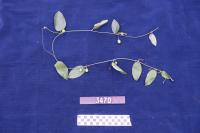
n. vine, growing in disturbed forest. Fruits green. (collection: Gregory M. Plunkett #3470)
Example: A man named Johnnie (Reuben’s grandfather) brought this vine to Aneityum to use it as a rope to tie objects. The ripe fruits are used to paint the face and hands and children make drawings from this dye.
bookmarkink
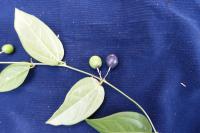
ink
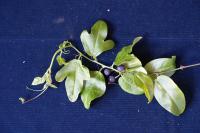
n. vine, growing in coastal forest. Fruits purple. (collection: Gregory M. Plunkett #3556)
Example: A man named Johnnie (Reuben’s grandfather) brought this vine to Aneityum to use it as a rope to tie objects. The ripe fruits are used to paint the face and hands and children make drawings from this dye.
bookmarkinmadidi
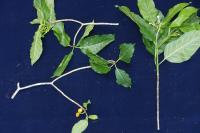
inmadidi
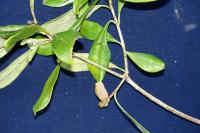
n. tree to 7 m, dbh 30 com (collection: Michael J. Balick #4870)
Example: This plant is used for spiritual purposes. When fruits are young, the children take the fruit, cut it open and take coconut leaf midribs, impaling the seeds on the midribs and painting themselves with the fruit.
bookmarkinmopoñ
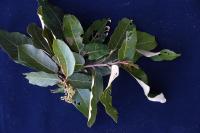
n. tree, 10 m tall (collection: Gregory M. Plunkett #3516)
Example: The young stems are used to make fishing spears. These stems are also used to make the poles that connect an outrigger to a traditional canoe, as they are light and strong. The large trees have extensive roots and stumps and are used as a pen for pigs by making a fence from these.
bookmarkinmoupog
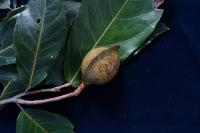
n. tree to 8 m, dbh 20 cm (collection: Michael J. Balick #4927)
Example: The wood of this tree is used as firewood. Children collect the dry fruits and use them for decorations and toys, for example playing with a fruit on the beach, driving it as if it were a toy truck or boat (photo).
bookmarkintesyaniau
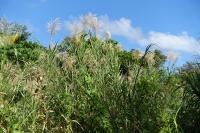
n. grass to 3 m, flowers brown. Growing in degraded secondary forest along trail. (collection: Michael J. Balick #4969)
Example: The stem of this plant is used to make walls of houses. Collect the stem and remove the leaves, and then take one of the bush vines (any of them) and tie the stems into bundles for making house walls or fences for chicken pens. Children make a whistle from a hollow piece of stem from this plant.
bookmarkinya
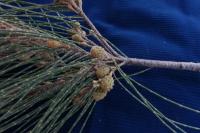
n. large tree, 16 m tall (collection: Gregory M. Plunkett #3222)
Example: 1. As a child’s game, some times children put the segments of the needles together to see who can make the largest one. 2. A "calendar plant"--when the needles are brown, it is an indication that people should not work hard, but should rest or they will not feel well. If they try to work they will feel sleepy--an indication of the season of higher heat. 3. Wood is used as firewood. 4. Firewood, inner bark good for ciguatera poisoning, scratch the inner bark and squeeze juice into a cup of water and give to the sick person to drink – very effective. Use the largest most mature part of the stem.
bookmarkkowei
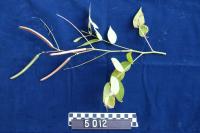
n. herb to 0. 75 m, fruits brown. Growing in cultivated area near village. (collection: Michael J. Balick #5012)
Example: Children use this fruit as a rattle. When parents go to the gardens or fields with their children, they collect the pods for the children to use as a rattle and amuse themselves. Unspecified medicinal use.
bookmarknahojcei
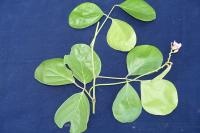
n. low-growing vine, growing next to airstrip just beyond coastal vegetation. Flowers purple. (collection: Gregory M. Plunkett #3544)
Example: To trap fish, the vine of this plant is rolled in large quantity and put on the reef in a circle at high tide in order to corral and trap the fish. At low tide the fish are then speared and harvested. Placement of the circle depends on the rocks and the reef. Children fold the large leaves and bite parts of the leaf to make designs as a craft object. This is a "message plant." If a person wants to build a house or garden in a specfic place, put a piece of the vine on a stick near the area to tell others that they should not build a garden or house hear this area--this is a Tabu message. There are a few other unspecified leaves added to the stick, not only this one.
bookmarknahojcei
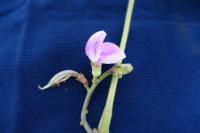
naipom̃yiv
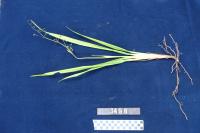
n. terrestrial plant, 60 cm tall (collection: Gregory M. Plunkett #3498)
Example: Children take a shoot of this plant and make a whistle from it. However, when children do this, they are told not to, as it will attract the rains, or a snake, that will hear the noise and come to the person. This is a folk belief. The base of the shoot of this plant is chewed and applied to fresh cuts as a styptic. Pull out top growth of plant that has not flowered and blow on it like a whistle. Ancestors used this as a whistle to attract snakes for edible – not today. Name means “balls or heaps of snakes” refer to their attraction.
bookmarknaipomyiv ~ naipomñiv
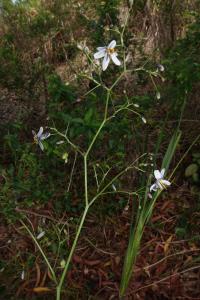
nametreyeñ
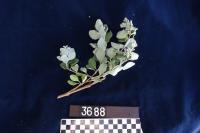
narpomyiv
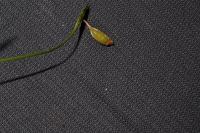
nelas
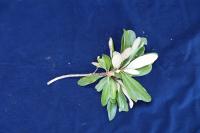
niyeg
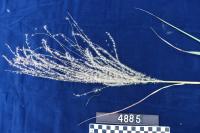
n. grass to 1. 5-2. 0 m tall, inflorescence white. Red clay soil (collection: Michael J. Balick #4885)
Example: Cut this grass in the morning, let dry for 2 days, and then use to weave the roof of a house. This is thicker and heavier than a coconut leaf. Also, use for cyclone house. (see photos of house) When indicating something is Tabu, tie the leaf and put it in an object like ripe bananas and people know it is Tabu and will not take it away.
bookmarkniyeg
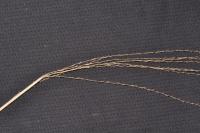
n. grass, 2. 5 m tall (collection: Gregory M. Plunkett #4071)
Example: 1. Dried leaves are used to make the thatch roofs of traditional houses. The same leaves are woven to make the walls of traditional houses. 2. When a large torch is required, many dried stems are bundled to form a flambeau. 3. The leaves of this plant are used to demarcate tabu areas. Further information about the practice withheld.
bookmarknomoj
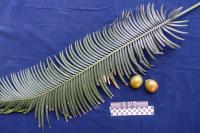
n. cycad to 3 m tall, 25 cm dbh (collection: Michael J. Balick #5010)
Example: In the past there were no toys for the children, so people made toys from the seed of this plant. They peeled the fruit, took the seed, removed the inside, punched one hole on each side, put a string through each of the holes and twisted the string to spin the seed such that it would make a whistling sound as the fruit spun faster and faster. On Palm Sunday, people use this leaf in Church. People plant this cycad around their homes and use it as an ornamental. Some people believe that having this plant around their homes will keep the bad spirits away.
bookmark